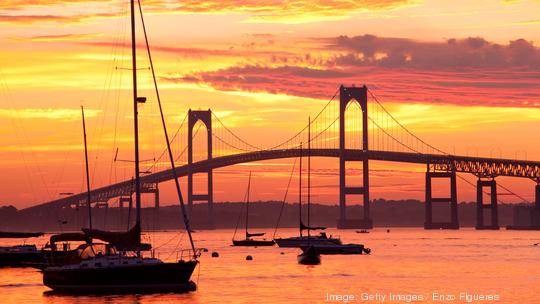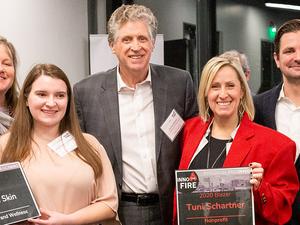
While in the early stages of launching startup Flux Marine, co-founders Ben Sorkin, Jonathan Lord and Daylin Frantin were all happily working out of co-working space in Boston's Seaport District. But when the coronavirus pandemic hit and closed many co-working spaces, the Flux Marine team, which is developing electric outboard motors to reduce carbon emissions in boating, found themselves in need of new office space.
Sorkin, who had been working at another job in Rhode Island, suggested the three temporarily try working in East Greenwich. Now, roughly a year later, FluxMarine has become a permanent resident of the tony Providence suburb.
“I think Rhode Island has been doing a really great job of pushing for sustainability, in general,” Sorkin told Rhode Island Inno.
Sorkin’s story is not unique. Many startups are coming to Rhode Island and finding it can be a perfect place for a company to grow, with its cheaper cost of living and close proximity to venture capital and startup hubs like Boston and New York. In the case of cleantech and bluetech startups, which focus on environmental sustainability and oceanic health, Rhode Island arguably can make as good a case as any city for why it’s an attractive place for early-stage companies to set up shop.
In early 2020, the Rhode Island Office of Energy Resources pledged to make Ocean State the first in the country to fulfill 100% of the state's electricity demand with renewable energy by 2030. Rhode Island is also one of the few states where residents can get both their gas and electric utilities from National Grid, which makes the idea of running pilots a little less daunting.
The 40 miles of coastline also have made Rhode Island an ideal place for bluetech startups. While bluetech is technically a different sector than cleantech, the two are more or less related as they both attack environmental issues.
“We see bluetech as being where cleantech was 20 years ago or where agtech was 10 years ago,” said Alissa Peterson, co-founder and executive director at SeaAhead, a venture acceleration firm that works with bluetech startups at every stage to accelerate growth. “We see this as a growth industry.”
Sorkin agrees with Peterson in the sense that there wasn’t a huge effort to turn away from gas-powered cars until someone created the electric car. Now, with Flux Marine and other startups on the cusp of creating electric-powered boats, he thinks there will be a lot more interest in making vessels on the water more sustainable.
But for all the progress in cleantech and bluetech, there is more work to do. After all, in the latest cohort of 30 startups in MassChallenge Rhode Island’s program, only three were cleantech startups and none were actually based in Rhode Island, according to Hope Hopkins, managing director of early-stage startups in New England at MassChallenge.
SeaAhead, which is based in Boston, also runs its BlueSwell Incubator specifically to fund and advance the development of startups in New England formed to solve ocean sustainability issues. In its first cohort, only one of the startups came from Rhode Island.
Blue sky for bluetech
Part of the problem in spurring more entrepreneurs to jump into cleantech and blutech comes from the fact that both are pretty heavily regulated, said Hopkins.
"There is no harmonization of regulations at the moment,” she said. “Each state has different regulations; sometimes it goes down to the municipal level, so it’s a lot for a startup trying to launch and learn the lay of the land.”
For bluetech in particular, Peterson believes that it really comes down to exposure.
“Companies haven’t been collected underneath this thesis and so therefore they haven’t been visible, right, because no one has been promoting them as a group and that makes them harder to find and engage with,” she said. “It hasn’t been a thematic focus.”
Luckily, startup-focused organizations are rising to the challenge to try to change this.
SeaAhead, according to Peterson, has gathered 53 startup members all specifically in the bluetech space. In addition to the BlueSwell Incubator, SeaAhead runs a Blue Angels Investment Group dedicated to the bluetech sector, which makes it easier for bluetech startups because they are talking to people that know the space on an in-depth level.
SeaAhead also runs the BlueGreen Innovation Challenge, which challenges college students to come up with novel solutions for energy, food, urban community, and coastal issues.
Sorkin also says that he’s had no issue when it comes to finding resources. He has found all sorts of help from organizations like the Cleantech Open, 401Tech Bridge, and the Rhode Island Marine Trades Organization.
“Connections are a pretty big part of it,” he said. “For any startup, it takes a village.”
Peterson concurs, adding that it has likely been difficult for investors and the startup ecosystem to find out about new sectors like bluetech and cleantech because all of these startups have pretty much been on their own up until very recently.
“We think that while there are a number of them already in existence, there will be a lot more as we promote the sector and as we demonstrate the pathway of entrepreneurship through the programs we are running,” she said.








